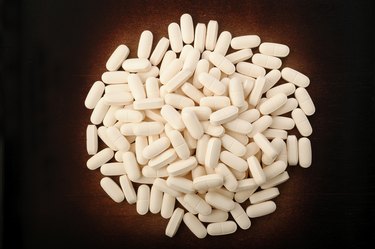
L-arginine and L-carnitine are two important amino acids that are synthesized in separate parts of your body and found in a variety of foods. Both amino acids are sold in supplement form and used for a variety of similar and different health-promoting purposes. Despite the relative safety of these amino acids, large doses might cause unwanted side effects, and you should talk to your doctor before taking any new supplement.
Synthesis and Food Sources
Video of the Day
Arginine is synthesized primarily in your small intestines, and it aids in liver detoxification, removes excess ammonia from your body and supports your immune system. Arginine-rich foods include carob, chocolate, dairy, gelatin, meat, oats, peanuts, soybeans, walnuts, white flour, wheat and wheat germ.
Video of the Day
Carnitine is a nutrient that is essential for the metabolism of fats and energy. It is found in meat, dairy, beans and avocado, and it is also produced by the body in your liver and kidneys.
Arginine and Cardiovascular Health
Arginine and carnitine both help support cardiovascular health. According to Memorial Sloan-Kettering Cancer Center, or MSKCC, arginine works as a vasodilator, meaning it relaxes smooth muscle cells, widens blood vessels and helps prevent high blood pressure. Due to its vasodilating properties, short-term supplementation with arginine might help treat coronary and peripheral artery disease, but more research needs to be done to confirm this theory. According to Phyllis Balch in her book "Prescription for Nutritional Healing," arginine might also help treat angina.
Carnitine and Cardiovascular Health
Research suggests that carnitine might help reduce high cholesterol levels and prevent chronic obstructive pulmonary disorder. Angina is a condition caused when your heart does not get enough blood, and it is characterized by chronic chest pain. According to the University of Maryland Medical Center, or UMMC, several clinical studies indicate carnitine helps soothe or prevent angina pain. The evidence is not as strong, but a few small studies showed that carnitine might also help improve muscle strength and help readjust abnormal heart rhythms after a heart attack.
Additional Arginine Supplement Uses
Arginine supplements are used to treat atherosclerosis, promote muscle gain and fat loss, increase the production of human growth hormones, enhance athletic performance, treat erectile dysfunction, hasten wound healing and treat fatigue. Arginine is also found in high amounts in the skin and connective tissue and is necessary for collagen formation. It is therefore purported to help heal and repair damaged tissue and to treat arthritis. These uses are largely based on anecdotal and not scientific evidence, however.
Additional Carnitine Supplement Uses
According to MSKCC, carnitine might be useful for the prevention of cancer, HIV and AIDS-associated muscle wasting. Additional purported uses include the reduction of chemotherapy side effects and the treatment of chronic fatigue syndrome, circulatory disorders, diabetes, diabetic neuropathy, erectile dysfunction, hyperthyroidism, infertility and kidney disease. It might also enhance strength and stamina, increase exercise performance and help you to lose weight. Finally, according to "Current Medical Research and Opinion" journal, carnitine seems to have neuroprotective properties, meaning it can help protect against and slow the progression of neurological disorders such as Alzheimer's disease and relieve senility-related depression and memory loss.
- Memorial Sloan-Kettering Cancer Center: Arginine
- Memorial Sloan-Kettering Cancer Center: Carnitine
- University of Maryland Medical Center: Carnitine
- "Current Medical Research and Opinion"; “Effects of acetyl-L-carnitine in Alzheimer's disease patients unresponsive to acetylcholinesterase inhibitors”; 2003